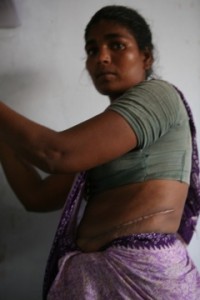In the Winter 2014 issue of Contexts, a magazine published by the American Sociological Association, Anne T. Gallagher reports that trafficking for organ removal is on the rise:
Trafficking of persons for organ removal is not an urban myth, but an increasingly common means by which the global shortage in organs is being met. Recipients are generally independently wealthy or are supported by their governments or private insurance companies. Victims are inevitably poor and from poorer countries, often unemployed and with low educational levels, which makes them vulnerable to deception about the nature of the transplant procedure and its potential impacts.
She furthers that many are forced to comply, are bribed or manipulated, and threatened into silence. Many become dangerously ill or die from complications from hastily performed procedures and inadequate (or absent) follow up care. Some are simply left to die with no intention of them surviving. Compensation promised is rarely paid in full, and is generally a tiny fraction of the promised price. Debt bondage or extortion often pressure individuals to “donate.” In many cases, organs are outright stolen.
Both men and women are victims of organ trafficking, but women tend to be especially vulnerable, as victims come from areas where women are still considered second-class citizens or property. Women are also more likely to be illiterate and have fewer opportunities and resources at hand. Sex trafficked women, not surprisingly, are especially vulnerable to organ trafficking as well. Just like other animals, women’s bodies are literally fragmented, butchered, bought and sold, and consumed by those with more power. Both women and other animals exist as (temporarily) living resources waiting to be harvested.
Not surprisingly, this horrific industry is rooted in patriarchy. As diet-related diseases increase as a result of our growing consumption of other animals, the demand for organ transplants rises. Kidneys are one of the top organs in demand, and the primary reason for transplant is diabetes. Diabetes is one of many diseases directly related to a non-vegan diet. The masculinization of meat and the association of animal foods with wealth fuels this irrational demand. Traditional plant-based (and feminized) diets become devalued and are quickly disappearing as Westernization spreads. Patriarchy not only influences the deterioration, but also the access to solutions. Not everyone enjoys equal access to a transplant. It is generally those in wealthier Western nations and usually men with this privilege.
In a previous essay, I discussed the ethical considerations behind organ donation as a vegan. I do not think it is appropriate to punish individuals who are suffering for systemic problems rooted in Western imperialism, patriarchy, and speciesism. I believe everyone should register as an organ donor, not only for the interests of the individuals in need, but also those animals (used as “donors” and in vivisection) and vulnerable humans who might be spared exploitation and death.
But it should not end there. Veganism is an ethical imperative for deconstructing these systems of oppression. While Westerners poison their organs with the death of Nonhuman Animals, poor women in India, Africa, and Asia suffer and die to replenish the bodies of the global rich. Of course, their poverty is also intimately linked with the West’s resource-intensive need to extort massive amounts of grain and water to funnel into livestock. The resulting pollution from this animal-industrial complex further weakens third world regions struggling to survive under the weight of colonialist and capitalist oppression. The consumption of other animals entails widespread global violence against all vulnerable groups for the pleasure, convenience, and privilege of a small few. Sadly, organ trafficking is but one of many cruel injustices bound to gross power imbalances. Anti-capitalist vegan feminism must be at the root of our activism. We must take an intersectional approach if we are to have any hope at success.
 Dr. Wrenn is Lecturer of Sociology and past Director of Gender Studies (2016-2018) with Monmouth University. She received her Ph.D. in Sociology with Colorado State University in 2016. She received her M.S. in Sociology in 2008 and her B.A. in Political Science in 2005, both from Virginia Tech. She was awarded Exemplary Diversity Scholar, 2016 by the University of Michigan’s National Center for Institutional Diversity. She served as council member with the American Sociological Association’s Animals & Society section (2013-2016) and was elected Chair in 2018. She serves as Book Review Editor to Society & Animals and has contributed to the Human-Animal Studies Images and Cinema blogs for the Animals and Society Institute. She has been published in several peer-reviewed academic journals including the Journal of Gender Studies, Feminist Media Studies, Disability & Society, Food, Culture & Society, and Society & Animals. In July 2013, she founded the Vegan Feminist Network, an academic-activist project engaging intersectional social justice praxis. She is the author of A Rational Approach to Animal Rights: Extensions in Abolitionist Theory (Palgrave MacMillan 2016).
Dr. Wrenn is Lecturer of Sociology and past Director of Gender Studies (2016-2018) with Monmouth University. She received her Ph.D. in Sociology with Colorado State University in 2016. She received her M.S. in Sociology in 2008 and her B.A. in Political Science in 2005, both from Virginia Tech. She was awarded Exemplary Diversity Scholar, 2016 by the University of Michigan’s National Center for Institutional Diversity. She served as council member with the American Sociological Association’s Animals & Society section (2013-2016) and was elected Chair in 2018. She serves as Book Review Editor to Society & Animals and has contributed to the Human-Animal Studies Images and Cinema blogs for the Animals and Society Institute. She has been published in several peer-reviewed academic journals including the Journal of Gender Studies, Feminist Media Studies, Disability & Society, Food, Culture & Society, and Society & Animals. In July 2013, she founded the Vegan Feminist Network, an academic-activist project engaging intersectional social justice praxis. She is the author of A Rational Approach to Animal Rights: Extensions in Abolitionist Theory (Palgrave MacMillan 2016).
Receive research updates straight to your inbox by subscribing to my newsletter.


